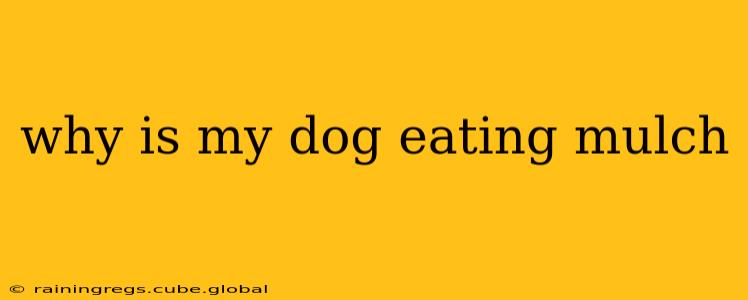Why Is My Dog Eating Mulch? A Comprehensive Guide to Canine Pica
Many dog owners find themselves puzzled and concerned when their furry friend develops a taste for mulch. This behavior, known as pica, isn't just a quirky habit; it can indicate underlying health issues or nutritional deficiencies. Understanding the reasons behind your dog's mulch munching is crucial for their well-being.
What is Pica?
Pica is a condition where animals (and humans) crave and consume non-nutritive substances. In dogs, this can range from dirt and rocks to wood, fabric, and yes, even mulch. While a small amount of mulch ingestion might not cause immediate harm, persistent consumption can lead to serious problems.
Why is My Dog Eating Mulch? Common Reasons
Several factors can contribute to a dog's desire to eat mulch. Let's explore the most common reasons:
-
Nutritional Deficiencies: A lack of essential vitamins, minerals, or nutrients can drive dogs to seek out substances that might (incorrectly) satisfy these needs. Mulch, while not a nutritional source, might seem appealing to a dog with underlying deficiencies. A balanced diet is crucial in preventing this.
-
Boredom or Anxiety: Just like humans, dogs can develop behavioral issues due to boredom or anxiety. Eating mulch can become a way to alleviate stress or occupy their time, especially if they lack sufficient exercise or mental stimulation.
-
Gastrointestinal Issues: Sometimes, dogs eat mulch to try and soothe an upset stomach. The act of eating might provide temporary relief, even if it doesn't address the underlying problem.
-
Taste and Texture: Certain types of mulch might have a pleasant smell or texture that appeals to a dog's sense of taste. This is less common than other reasons but can contribute to the behavior.
-
Medical Conditions: Underlying medical conditions like metabolic disorders or cognitive dysfunction can alter a dog's appetite and lead to pica.
What Types of Mulch Are Most Dangerous?
Not all mulch is created equal. Some pose more significant health risks than others. Cocoa bean mulch is particularly dangerous, as it contains theobromine, a toxic compound for dogs. Cedar mulch can also cause irritation to the gastrointestinal tract. Even seemingly harmless mulches can cause intestinal blockages if ingested in large quantities.
What Should I Do if My Dog Eats Mulch?
- Monitor your dog: Observe for any signs of distress, such as vomiting, diarrhea, lethargy, or changes in appetite.
- Identify the type of mulch: Knowing the type of mulch ingested is important for determining the potential toxicity.
- Contact your veterinarian: If you suspect your dog has ingested a large amount of mulch, especially a toxic type, contact your veterinarian immediately. They can assess the situation and advise on the best course of action.
- Prevent future ingestion: Remove access to mulch, provide more engaging toys and activities, and ensure your dog receives a complete and balanced diet.
How Can I Prevent My Dog from Eating Mulch?
- Provide a balanced diet: Consult your veterinarian to ensure your dog's diet meets all its nutritional needs.
- Increase exercise and mental stimulation: A tired dog is less likely to engage in destructive behaviors.
- Create a stimulating environment: Offer a variety of toys, puzzles, and opportunities for interaction.
- Use deterrents: Consider using sprays or fences to keep your dog away from the mulch.
- Consider alternative landscaping: Explore mulch alternatives that are less appealing to dogs, such as gravel or rock.
Remember, addressing the root cause of your dog's mulch-eating habit is key to preventing future incidents. A visit to your veterinarian can rule out underlying medical issues and guide you towards appropriate solutions. By understanding the reasons behind this behavior, you can help your canine companion stay healthy and happy.
